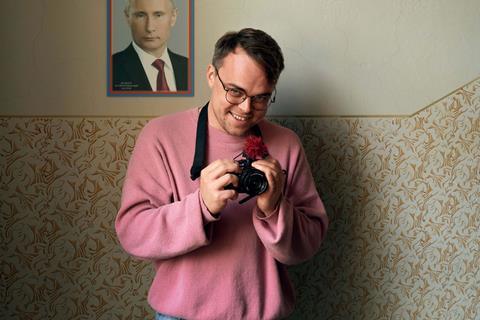A Russian schoolteacher sheds light on Putin’s indoctrination of the country’s children

Dirs: David Borenstein, Pavel Talankin. Denmark/Czech Republic. 2025. 90mins
Many believe that school should prepare you for the real world – but what if that world is on a war footing? In this eye-opening documentary, David Borenstein, working with Russian teacher-turned-documentarian and co-director Pavel ‘Pasha’ Talankin, offers a lesson about Russian schoolrooms. They reveal the insidious propaganda machine that has been busily at work within them since the country’s invasion of Ukraine, which aims to arm the children for conflict.
A reminder of children as the innocent victims of war
Mr. Nobody Against Putin gives a rare view from the other side of the border to Ukrainian documentaries including Mstyslav Chernov’s Oscar-winner 20 Days In Mariupol and Oksana Karpovych’s Intercepted. Although the subject matter is sombre, Talankin, who filmed the documentary and provides its narrative voice-over, also comes at it from a personal and often playful angle. The approachable tone and likeable guide make it accessible for those who are not well versed in the subject, and should see it attract interest beyond the festival circuit after its world premiere in Sundance.
When Vladimir Putin’s invasion began in February 2022, Talankin was the event coordinator and videographer at Karabash Primary School 1, which also educates students through their teens. That put Talankin in the unique position of being able to see propaganda creeping into the classroom while also having a legitimate means to document it. We meet him about two-and-a-half years later, as he is set to try to leave the country, before the action flashes back, adding tension to all that follows.
YouTube clips introduce us to the town, in the south west of Russia. They indicate that pre-war Karabash was a stop-off for ecological disaster tourists thanks to its copper smelting plant, with people flocking to ’the most toxic place on earth’. For Talankin, however, who was a pupil at the school where he now teaches, it is home and a place he loves. He’s enthusiastic in general, making him a hit with the kids and an appealing companion for us.
Things change after the invasion, as dictats begin to arrive from Moscow insisting that the children be filmed singing patriotic songs and other material. Teachers also receive scripts full of fake claims about Ukraine’s ‘neo-Nazis’ and the devastating impact of the war on the rest of Europe. While some of the staff welcome this, others, like Talankin, do not – even flagging up the fact that information is untrue to the children before dispensing it.
Unwilling to become “a pawn of the regime”, Talankin impulsively responds to a social media post asking for people whose job ’has been affected by the special military operation’ to get in touch for a potential show. Although Mr Nobody wisely doesn’t become distracted by going into detail, this is how Talankin came to be working with Borenstein – who previously made documentaries including Can’t Feel Nothing and Dream Empire. Borenstein went on to shape the film, and provided remote support as Talankin shot it. Snippets of video diaries, which Talankin also began to film during this period, add a sense of immediacy, all smoothly and briskly edited together by Nicolaj Monberg and Rebekka Lonqvist.
In the school, Army-style drills being incorporated into daily routines are just the start of a slippery slope to militarisation that will later see grenade-throwing treated as a sporting event like discus. Meanwhile, the figurative mercenary attitude of some teachers is replaced by actual gun-toting Wagner Group mercenaries.
Talankin insists that he isn’t brave like those who get arrested for protesting, although his film is testimony to his long-term courage. His spontaneity, however, makes the potential threat to him feel acute, such as when he replaces the Z-shaped tape on the school windows – a Russian pro-war motif – with more traditional Xs. His connection to the kids also brings home the loss being faced by many of his current and former students, as mobilisation calls either them or their siblings to the frontline. While not seeking to paint all Russians as ‘victims’ and explicitly acknowledging the situation is far worse for Ukranians, Talankin’s footage comes as a reminder of children as the innocent victims of war.
The sobering sensation is that this is only the start and that while older kids, who remember a pre-invasion world, may be sceptical, younger ones will be groomed to know nothing different. One of the YouTube clips indicates the average life expectancy in the heavily-polluted Karabash is 38 years; chillingly, with Putin now sending so many youngsters to fight, that figure seems only likely to decline.
Production company: Made in Copenhagen
International sales: DR Sales, Kim Christiansen kimc@dr.uk
Producers: Helle Faber
Cinematography: Pave Talankin
Editing: Nicolaj Monberg, Rebekka Lonqvist
Music: Michal Rataj























